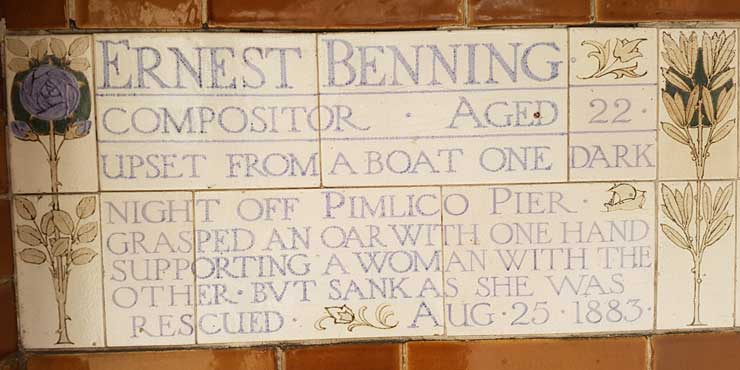
As the Victorian press saw it, Ernest Benning (1862 - 1883) died performing an heroic act of gallant chivalry.
His memorial plaque in Postman's Park is inscribed, "Ernest Benning, Compositor, Aged 22, Upset From A Boat One Dark Night Of Pimlico Pier Grasped An Oar With One Hand, Supporting A Woman With The Other, But Sank As She Was Rescued. Aug 25 1883."
It took some time before his body was finally found, close to Waterloo, on Friday 7th September 1883.
The Globe published a report on the known facts on Saturday 8th
The body of Ernest Benning, aged 22, a compositor, in the employment of Messrs. Spottiswoode and Co., who was drowned under peculiar circumstances, was picked up last night under Waterloo Pier.
On the afternoon of Saturday, the 25th August, the deceased, with two other young men, Francis Palmer and Henry Brooks, and a young woman named Jeannette Simmonds, hired a boat at Audsley's Waterloo Bridge, and rowed to Kew.
They left Kew on the return journey at 7 p.m., and arrived off Pimlico Pier at 9.
The night was very dark and the tide high.
They suddenly came into collision with a paddle steamer, the Wedding Ring, on her way into moorings up stream. The boat was injured and the occupants thrown into the water.
Only one of the party, the young man Palmer, was able to swim, and he and Brooks, as well as the girl Simmonds, were rescued by passing boats.
But Benning, who was steering at the time of the collision, and was seen while in the water to be grasping an oar with one hand, and endeavouring to support the young woman with his other arm, sank at the moment when the girl was hauled into the boat which saved her."
The inquest into his death was held on Tuesday 11th August 1883.
Lloyd's Weekly Newspaper Published the following account of the proceedings in its edition of Sunday 16th September 1883:-
"On Tuesday Mr. Langham held an inquiry at the St. Martin's Vestry-hall as to the death of Ernest Bradley Benning, aged 22 years, lately residing at 52, Blurton-street, Lower Clapton, who was drowned in the Thames through the capsizing of a boat after being in collision with the London Steamboat company's steamer Wedding Ring, off Pimlico pier, on the evening of Aug. 25.
Evidence was given to the effect that deceased was out in a boat with a young woman, named Simmonds, Henry Brooks, and Frederick Palmer. They went to Kew, and were returning a little after nine o'clock when the accident occurred.
William Large, engineer at Messrs. Muggeridge's Steam mills, Upper Ground-street, Blackfriars, deposed that, on the evening in question, he was out in a small boat with his wife and child, near Old Pimlico pier, and about a steamboat's length from the small skiff in which the deceased was.
He saw the steamer coming in the opposite direction.
After the collision he asked his wife to keep herself quiet, and told her to sit with the child in the bottom of the boat.
He then rowed to the scene of the accident, and met the boat drifting down with the tide.
He saw two persons in the water together - one was a female. They were low in the water. Getting hold of the female, he put her hands on the side of his boat and told her to hang on there.
While he was doing this, one of the young men (Brooks) shouted out "Make haste! make haste!" and he did the same to him, and told him to hang on.
He then looked out for the other, but could not find him.
A third one was saved in a fishing-boat.
When he found that further search was useless, he pulled Brooks and the female into his boat. They were both exhausted. Witness had a boy named Corking in the boat with him, and he rendered great assistance.
By Mr. Moss: In his opinion the accident was due to the occupants of the small boat losing their presence of mind on seeing the steamer approach, and pulling the wrong steering-line.
Alfred George Pendrill, the captain of the Wedding Ring, and William French, the first mate, both expressed it as their opinion that the collision was attributable to the occupants of the boat, who caused it to capsize by standing up.
Evidence having been given as to the discovery of the body of the deceased under Waterloo pier on Friday, the jury returned a verdict of "Accidental death," and added the following rider:-
"We desire to express our admiration of the coolness and bravery shown by the witness Large and John Corking, in saving the lives of two of the occupants of the boats."